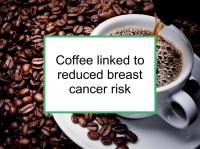A new prospective study has investigated the links between coffee and black tea intake and breast cancer risk. The study included 335,060 initially cancer-free women. They were enrolled and completed a dietary questionnaire between 1992 and 2000. Participants were followed until 2010, for an average of 11 years.
During this time 1,064 of the women were diagnosed with breast cancer before menopause (premenopausal breast cancer), and 9,134 were diagnosed with breast cancer after menopause (postmenopausal). Black tea consumption was not found to be associated with breast cancer risk, regardless of menopausal status.
Women who did not drink decaffeinated coffee were observed to have a slightly lower risk of postmenopausal breast cancer than women who were low consumers. However, there was no evidence of a dose-response relationship. Women who drank decaffeinated coffee exclusively did not have significantly different risk of breast cancer than women who sometimes drank decaffeinated or those who did not drink any type of coffee. The authors conclude that decaffeinated coffee does not appear to be associated with breast cancer risk.
On the other hand, caffeinated coffee consumption was found to be associated with slightly lower risk of postmenopausal breast cancer. Women with high consumption had a 10% lower risk compared to those with low consumption. The results were similar when the women were divided according to hormone receptor status.
However, the authors also observed a linear trend for lower risk of breast cancer with increasing coffee intake that was strongest for postmenopausal ER-/PR- disease. The risk of ER-/PR- disease was found to be lower by 4% for every 100 ml increase in coffee intake. Coffee consumption was not found to be associated with premenopausal breast cancer. The authors conclude that higher caffeinated coffee intake may be associated with lower risk of postmenopausal breast cancer.
Please see our article on coffee for more information.
